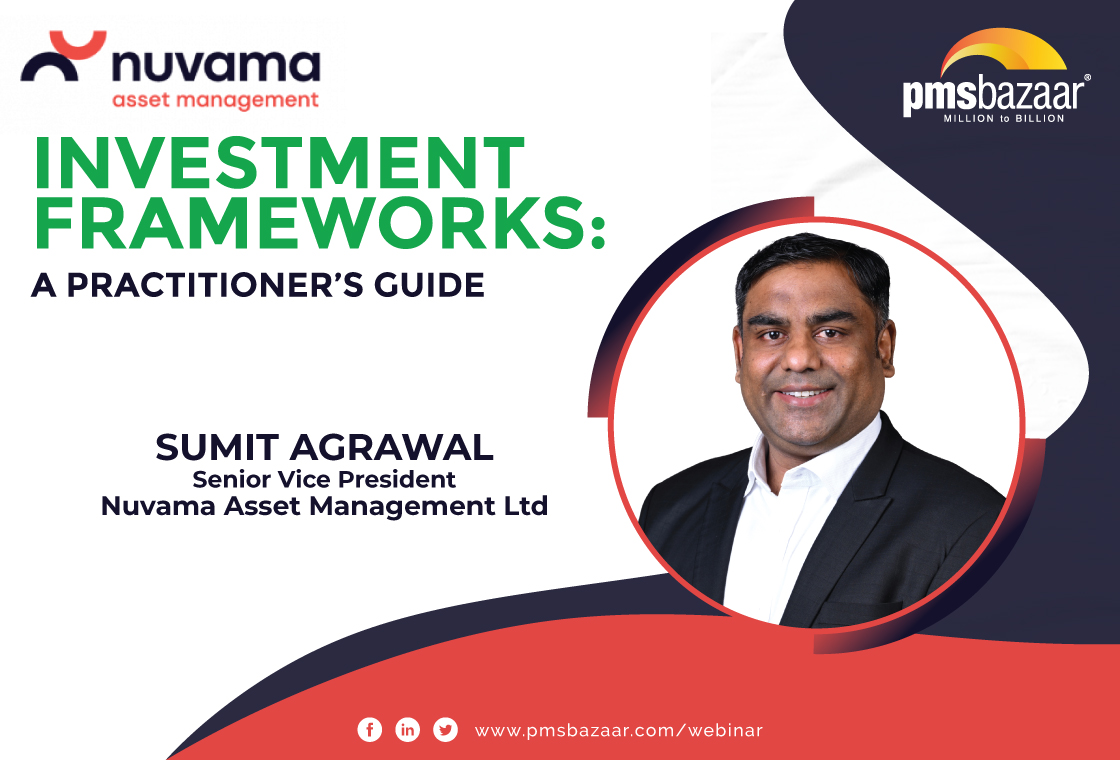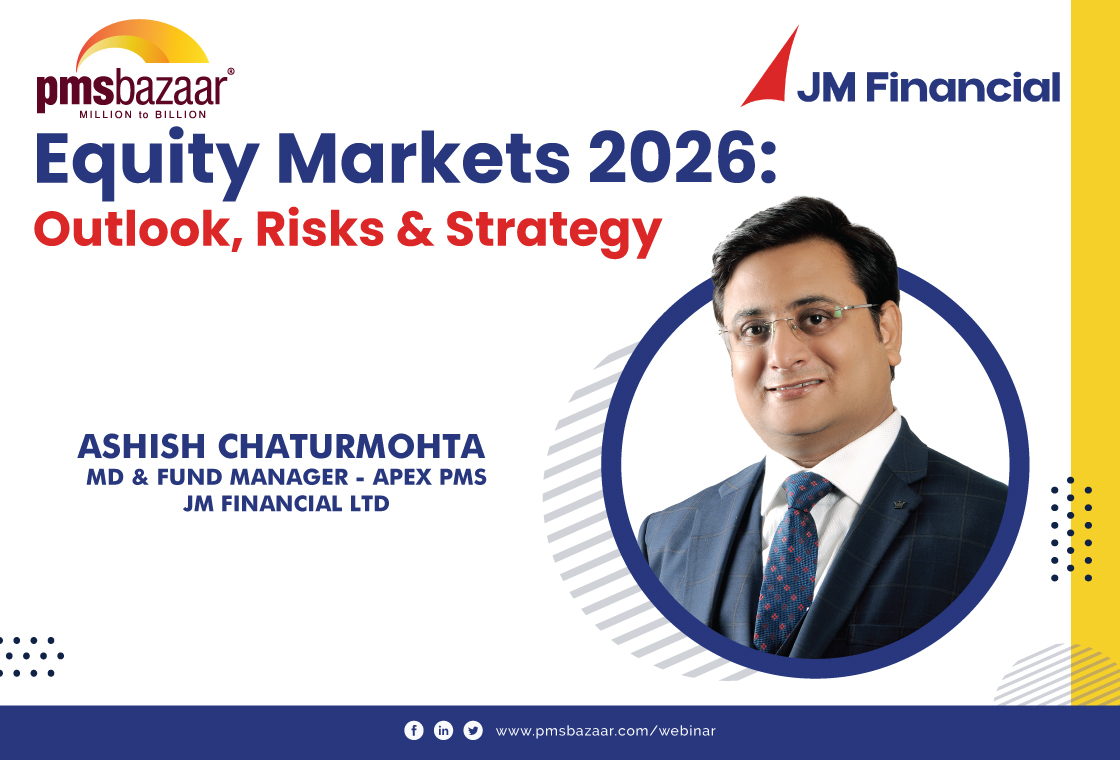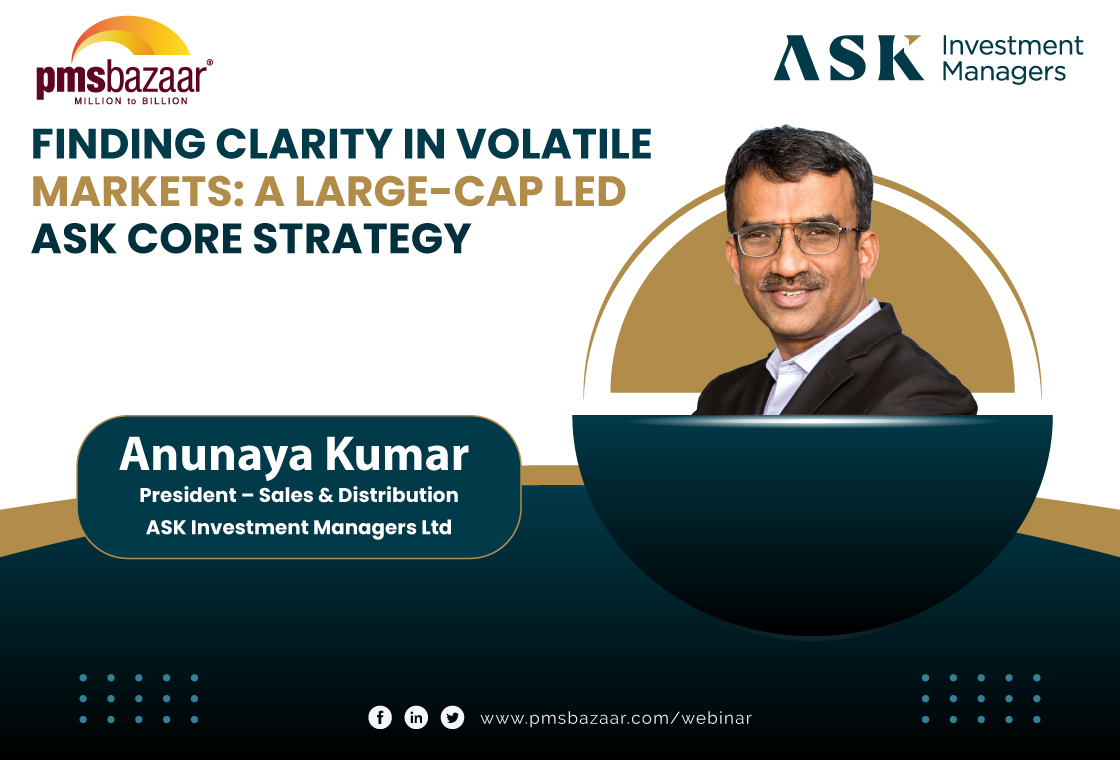This blog summarises the insights shared by Aniruddha Sarkar, CIO & Portfolio Manager at Quest Investment Advisors, during a webinar hosted by PMS Bazaar titled ‘Indian Markets at Crossroads of Sound Fundamentals and Rich Valuations - What Should Investors Do?’

The webinar explored current market conditions, geopolitical impacts, and investment strategies in a volatile global economy.
Geopolitical Resilience and Market Stability
Aniruddha Sarkar argued that economies can grow even amidst conflicts, citing examples like the Ukraine-Russia war and the ongoing Israel-Iran tensions. He noted that both developed and emerging markets have continued to grow despite these conflicts, with equity markets in India and the U.S. reaching new highs. This resilience, Sarkar suggested, is a key reason why investors should not overreact to short-term geopolitical risks. He highlighted that markets tend to recover quickly from geopolitical disruptions, referencing various unpredictable events over the past few years, including regulatory shifts, elections, and budget crises.
Mitigating the Impact of Crude Oil Prices
Sarkar acknowledged that crude oil is one of India's largest import costs. When the Ukraine war caused a sharp rise in oil prices, India countered the impact by purchasing discounted oil from Russia. This move helped control the import bill and shielded the economy from severe shocks. Additionally, the weakening Chinese economy, another major oil consumer, has kept global oil prices stable. While oil prices may see short-term spikes due to tensions in the Middle East, Sarkar remained optimistic about India's medium- to long-term outlook. India's diversified oil sourcing strategies have minimised its vulnerability to sudden price changes, contributing to economic stability and fostering investor confidence.
Shifting Interest Rate Dynamics
Aniruddha Sarkar pointed out that historically, rising interest rates in developed markets have drawn investors away from emerging markets. Conversely, declining rates have typically encouraged foreign institutional investors (FIIs) to invest in emerging markets. However, this pattern has recently changed. Despite the U.S. Federal Reserve cutting rates, FIIs have been withdrawing from India, suggesting that other factors—such as growth prospects and market valuations—are now playing a larger role in influencing FII behaviour. In contrast to aggressive rate cuts in developed markets, the Reserve Bank of India (RBI) has taken a more measured approach. India’s strong economy, with controlled inflation and stable growth prospects, allows the RBI to maintain investor confidence without resorting to drastic rate reductions.
India's Growth Potential Compared to China
Aniruddha Sarkar compared the growth trajectories of India and China, highlighting that while China's rapid growth was driven by its focus on manufacturing, India positioned itself as the ‘back office of the world,’ excelling in IT services but lagging in industrial development. Although China's per capita income is significantly higher than India's, he emphasised that India does not need to replace China in global manufacturing but can still capture a significant portion of the market. He pointed to India's substantial growth potential in sectors like textiles, particularly as Bangladesh, one of its main competitors, faces economic challenges.
Sectoral Opportunities and Portfolio Allocation
Aniruddha Sarkar discussed the booming Indian real estate sector, comparing it to China's a decade ago. This growth, he argued, offers substantial investment opportunities and could play a critical role in driving India’s future economic expansion. He also addressed SEBI's regulatory changes concerning Futures and Options (F&O) trading, supporting the restrictions as a way to protect retail investors from significant losses and promote long-term investment in equities.
Regarding corporate earnings and the festive season outlook, Aniruddha Sarkar highlighted consumer discretionary, hospitality, and healthcare as sectors poised to outperform, while capital-intensive industries like metals and oil and gas may struggle. He emphasised the importance of adjusting portfolio allocations based on sector performance, focusing on sectors with improving margins and earnings potential to navigate market volatility.
To get a better understanding of the pointers discussed above, you can watch the full video from the link below:
Get access to rich data and analytics of PMS & AIF by subscribing to us. Join the 70000+ investors & experts: Subscribe NOW
Disclaimer: Any Stocks/sectors mentioned in this blog are for educational purposes only. This blog does not constitute financial advice. Please consult with a qualified financial advisor before making any investment decisions
Recent Blogs

January Rout, Extreme Dispersion: PMS Returns Swing From Losses to Gains
Benchmark falls deepened losses, but multi-asset and debt cushioned portfolios meaningfully

Investment Frameworks : A Practitioner’s Guide
PMS Bazaar recently organized a webinar titled “Investment Frameworks: A Practitioner’s Guide,” which featured Mr. Sumit Agrawal, Senior Vice President, Nuvama Asset Management Limited. This blog covers the important points shared in this insightful webinar.

Aurum Multiplier Portfolio - Where Small and Mid-Cap Alpha Meets Large-Cap Stability
PMS Bazaar recently organized a webinar titled “Aurum Multiplier Portfolio - Where Small and Mid-Cap Alpha Meets Large-Cap Stability,” which featured Mr. Sandeep Daga, MD& CIO, Nine Rivers Capital and Mr. Kunal Sabnis, Portfolio Manager, Nine Rivers Capital. This blog covers the important points shared in this insightful webinar.

Flat Markets, Wide Outcomes: How 484 PMS Strategies Performed in Dec 2025
December 2025 was a month where market returns stayed close to flat, with the Nifty 50 TRI at -0.28% and the BSE 500 TRI at -0.24%.

Equity Markets 2026: Outlook, Risks and Strategy
PMS Bazaar recently organized a webinar titled “Equity Markets 2026: Outlook, Risks and Strategy,” which featured Mr. Ashish Chaturmohta, MD & Fund Manager – APEX PMS, JM Financial Limited. This blog covers the important points shared in this insightful webinar.

MICRO CAPS: The Dark Horses of the Indian Equity Market
PMS Bazaar recently organized a webinar titled “MICRO CAPS: The Dark Horses of the Indian Equity Market,” which featured Mr. Rishi Agarwal and Mr. Adheesh Kabra, both Co-Founders and Fund Managers, Aarth AIF. This blog covers the important points shared in this insightful webinar.

Finding Clarity in Volatile Markets: A Large-Cap Led ASK CORE Strategy
PMS Bazaar recently organized a webinar titled “Finding Clarity in Volatile Markets: A Large-Cap Led ASK CORE Strategy,” which featured Mr.Anunaya Kumar, President – Sales and Distribution ASK Investment Managers Limited. This blog covers the important points shared in this insightful webinar.
.jpg)
Passively Active Investing — A Modern Investor’s Lens on ETF-Based PMS
PMS Bazaar recently organized a webinar titled “Passively Active Investing — A Modern Investor’s Lens on ETF-Based PMS,” which featured Mr. Karan Bhatia, Co-Founder and Co-Fund Manager , Pricebridge Honeycomb ETF PMs. This blog covers the important points shared in this insightful webinar.

